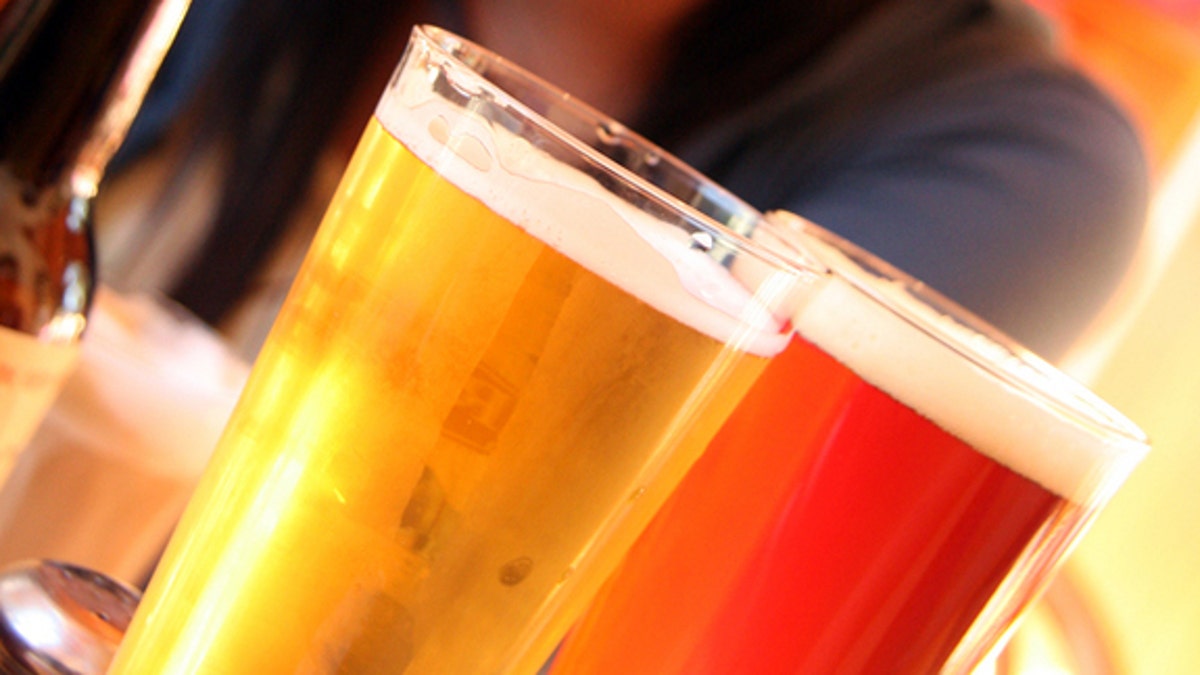
(Rita Juliana | Stock Xchng)
Beer lovers rejoice. A silver lining in this troubled economy is that demand for beer is booming. Not just any, beer, but small-batch, craft brew -- up 12 percent in volume in the first half of 2012, according to the Brewers Association.
“Most breweries are at capacity. They can barely make enough beer to meet demand,” said Bob Pease, chief operating officer for the Brewers Association.
This isn’t just good drinking -- it’s good business. Nearly 2,000 craft breweries operate in the U.S and employ 100,000 people. Pease says that one job is created for every 1,000 barrels of brew made.
With the election just days away, brewers are forecasting what the next four years are going to look like –and distilling down which administration would be more beneficial for the industry.
Ron Extract, co-owner of Jester King Brewery in Austin, Texas said he’s hoping for Obama. “Obama brews beer in the White House. Romney doesn’t drink. I’ll leave it at that.”
But, Pease said it’s hard to anticipate which candidate would be better for the industry; it’s just important that ingredients like hops and barely thrive over the next four years to keep the beer business growing.
Yet under several different White House administrations, brewers have said regulations by the Alcohol and Tobacco and Tax and Trade Bureau (TTB), the federal body that oversees the industry, have stymied the growth of many craft breweries.
A federal excise tax, that was started to help fund the Civil War and last updated in 1976, skims $7 off of the sale of every barrel of the first 60,000 produced each year. After 60,000 and up to 2 million, the tax is $18.
Last year, the TTB brought in a whopping $3.1 billion in excise taxes from beer into the general fund.
Billy Klingel, head brewer at Oyster House Brewing Company in Asheville, North Carolina told FoxNews.com the hefty tax keeps him trying new products and hiring extra help. He also pays a state tax of $18. “It prevents me from having a little more money to spend on ingredients.” Klingel said he turns little profit and the tax doesn’t allow him to earn a decent wage.
Klingel said in terms of his business, it won’t matter much to him who makes it into the White House. “It seems they are both pro-small business,” he said. Klingel sees the potentials for biggest change through Congress. He is among many craft brewers in support of the Small Brewer Reinvestment and Expanding Workforce Act, commonly known as the Small BREW Act, introduced by Sen. John Kerry (D-Mass.), and Sen. Mike Crapo (R-Idaho).
If passed, it will drop the tax to $3.50 for the first 60,000 batches and $16 for barrels between 60,001 and 2 million.
The brew bill has not been an issue brought up by Obama or Romney as they continue their swing state tour in the final days up to the election, but both Republicans and Democrats in the House and Senate have shared support of the bill.
Mark Calabria, director of financial regulation studies at the libertarian-leaning Cato Institute, opposes the existing tax and said losing it altogether would give a boost to the industry.
“It’s a relatively small amount for the overall federal budget,” he said.
Another sticking point for small brewers is the labeling process. The TTB must approve all labels that go on the bottles. That doesn’t include some state regulations that require brewers to print alcohol content on the beer labels.
A few years ago Extract said he went through a strenuous process in attempt to distribute a “Buddhist Brew,” a craft brew mixed with a Kombucha tea ingredient.
He submitted the label, but the TTB was hesitant to approve because of the ingredients.
“We couldn’t obviously sell the product without labels, so we were just sitting on beer waiting for the government to process the application.”
Extract said it resulted in a standstill in production and a financial loss. TTB later approved the label.
“Bottom line is what is on the label needs to accurately reflect the contents of the bottle,” said Tom Hogue, spokesman for the TTB.
But Extract is not alone when it comes to the frustrations with the TTB.
Klingel made at least 10 attempts to get his first label style approved by the TTB. “That was certainly a hurdle and one many a nightmare that kind of made me want to quit and crawl into a hole some days,” said Klingel.
Hogue said the average approval time is 9 days; but the agency has up to 90 days to respond.
But Calabria said regulation stunts creativity and doesn’t draw in beer shoppers.
“The real incentive for the brewery is to have something provocative, where as the regulator wants you to have it as bland as possible.”
Brewers said a new administration might not make a huge difference; they would just like to see a dip in the excise taxes. For those Americans who may feel the need for a drink or two after this long, grueling election cycle, craft beer might be a good choice.
